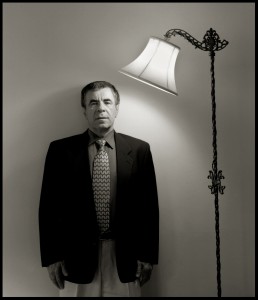S2: Episode 34 - Abdu

Episode Information
[Intro Music]
Narrator: Welcome to Hunger and Resilience, narrative histories about the complexity and experiences of hunger. A traveling exhibition and weekly podcast edited and hosted by Michael Nye, supported by the San Antonio Food Bank, Eric Cooper, executive director. We are grateful for the honesty and eloquence of every voice. Episode 34, Abdu.
Abdu: I have a cousin that’s very close to my age, and for some reason I remember that he and I went to the edge of our small village, which has a very, very steep slope. And he and I were competing in calling our grandfather all the way to New York. But we were just screaming his name. Call him, Hey Grandpa, we miss you. I just remember standing there and just kind of yelling my voice. And hearing the echo back, we do have a saying in Arabic that says, “If you do not have an older person in your home, go out and buy one.”
I have experienced hunger. The first year we came back to Lebanon, I was “about 12 years old. We arrived in the springtime, which is beyond the planting season. And we were farmers. There was no other source of food. But yes, I have experienced it. I have cried because of it, but that’s relative compared to someone who is experiencing it day in, day out. I would not say that I know hunger. There was always a way of getting a bite of one thing or another. I am an internist with a specialty in geriatric, which is the care of the elderly. If, if I had to think of one thing that’s recurring is it creates a perspective. Uh, those patients, uh, many of them are much older than I am, much wiser. It keeps reminding me of my own humanity and my own mortality.
As a hospice medical director, I was asked to go see, uh, one of the patients. Uh, so the nurse and I went to the home. Uh, when we opened the door and went in, uh, he was lying on a bed that was very low, and he clearly was a very tall man, but very emaciated with a very gravelly voice. His grip was pretty good. Uh, it became very obvious that he had no muscles whatsoever, and his legs were very dark blackish. And at the head of the bed, there was a 38 gun. And the first thing out of his mouth to me was, I am not leaving this house. I reassured him that I was there to see what I could do to make things easier and, uh, make, uh, him having less pain. Uh, he would be a patient who did not express hunger. And I’m not sure whether he had hunger or not, because after a while without food and water, the sensation of hunger goes away. But he clearly was malor and he clearly was starved.
There’s a certain number of calories that each of us requires just to exist. First and foremost is possibility of death, uh, comes to mind, feeling disempowered, uh, becoming very aware of time, having problems falling asleep, uh, or even sleeping so you don’t feel hunger. Being angry, uh, jealous of people who had food. Is, is there any reason why, especially in our community, we should have hunger? I think every one of my patients, if I can use the word hungers for resolution, they come because they think and believe that I can make the discomfort of their illness real or perceived a little more tolerable. I really, I really believe that that connection with humans is what really brings in the satisfaction. And I thought that medicine is a place where sincerity is not negotiable. It has to be the backbone of the relationship. So I, I try not to be the negative conscience, if you like. I try to be someone who will try to help them find a way to deal with whatever they’re dealing with.
[Outro Music]
Host: Abdu is a friend, and we would often have breakfast together at Mi Tierra Restaurant in downtown San Antonio. Abdu grew up in Lebanon, and I love his childhood. Quote. If you don’t have a grandfather or an older person living with you, go out and buy one. Yes, yes. We all need a perspective in our lives. Abdu is the doctor that we all want. He listens, he pays attention. He cares for his patients. He’s knowledgeable. He offers a perspective about nutrition and food, and aging, and hospice care, those last difficult years. Thank you, Abdu, for your wisdom and your caring presence, I’m Michael Nye. You can go to my website, michaelnye.org/podcast for portraits and transcripts. Thank you for listening. We are grateful for the honesty and eloquence of every voice.
